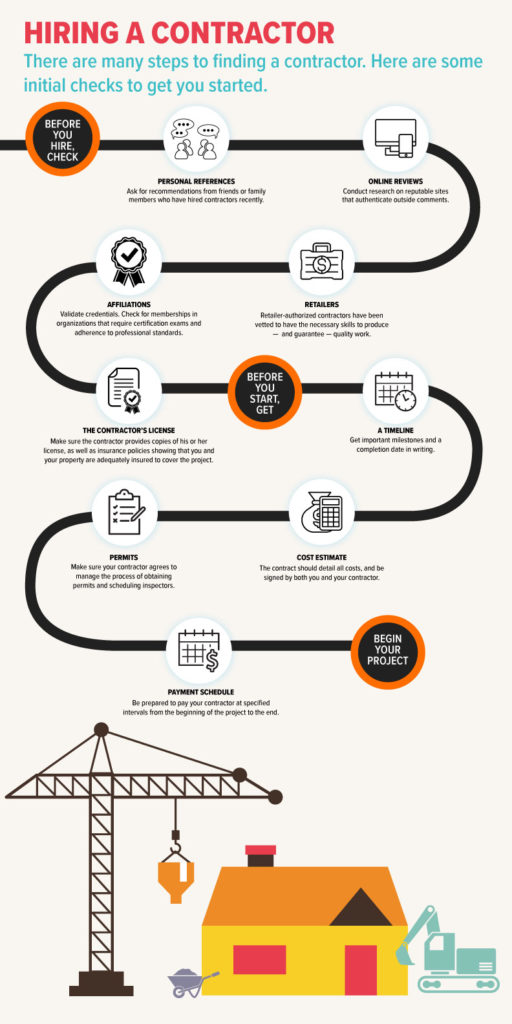So you’re ready to give your home a makeover. Great! Transforming your home into an entirely new place can be an exciting process. It can also be a major source of stress. If you’re not careful when hiring a home improvement contractor, you could wind up creating a nightmare instead of your dream home.

It is clear that not all contractors are created equal. Performing due diligence before engaging the right team makes all the difference.
- Your best resource is usually a friend or family member who has firsthand experience with a contractor. You need someone who will give you the unvarnished truth about their experiences. If they express pleasure with the workmanship, cost and the general relationship with a contractor, you’ve probably got a top candidate.
- Online reviews may be helpful, but make certain the posts you read are on reputable sites that authenticate outside comments.
- Home improvement stores can be a great referral source. Contractors authorized to provide services under the retailer’s banner have been vetted to assure they have the necessary credentials and skills to produce – and guarantee – quality work products.
- Validate your contractor’s credentials. Check their memberships in national organizations that require contractors to pass certification exams and adhere to strict professional standards. Also check business bureaus, city building offices, and other local resources to make sure they’re in good standing.
- Your research may reveal that one contractor has an especially good record in a certain type of remodeling project, but is not as strong in others. That’s not necessarily bad, it just means you may want to look elsewhere if your project isn’t one of his or her areas of strength.
- Don’t ever work without a detailed, signed contract. And make certain you have copies of the contractor’s license as well as proof you’ve been covered on their insurance for your project.
- Obtain at least three bids. There can be a wide disparity in what different contractors charge for the same project.
Managing contractor bids
Before asking for bids, it’s best to first think about whether you need a general or specialized contractor for your specific project. Always be sure to get bids in writing so you have official documentation about your agreements.
Once you get your bids, do your research. Meet your contractor to make sure it’s someone you will be able to easily communicate and work together with. Evaluate their portfolio, including references, to make sure your contractor has been honest and timely.
“You get what you pay for” in a contractor
A note of caution from Gary Haldeman with HC Remodel & Design in Omaha, Neb. He is a respected industry professional with more than 30 years of experience, who is certified by NARI and is a LightStream affiliate.
“In some instances, it may not be wise to make your selection of a home remodeling professional based solely on price. If you obtain several bids and one of them is much lower than the others, that’s probably a red flag,” he says.
A lowball bid could mean the contractor is in a cash crunch and may need to generate quick revenue. Unfortunately, it might indicate he or she is more focused on getting their hands on your money than providing quality workmanship. On the other hand, low estimates may have nothing to do with the contractor’s finances and more about winning a bid on price by using lower-quality materials.
“Generally speaking, you get what you pay for,” Haldeman noted.
Cutting corners now may be more expensive in the long run as you may have to repair, refurbish or replace lower-quality products much sooner.
Checking your contractor’s license
Going with an unlicensed contractor can result in your project going south very quickly. Most states require contractors to be licensed and it’s important to always check that their qualifications are current and up to date. You can check with your local building department, consumer protection agency or even check online and see if there are reviews from trustworthy websites. You’ll never go wrong with asking the contractor themselves for their license and registration before accepting their bid.
Haldeman says you should check to see if a contractor has had liens placed on properties by subcontractors showing he or she may have failed to pay obligations in a timely manner. One or two liens on the record over an extended period of time may not be cause to step back if the contractor can explain what happened to your satisfaction.
If you find a pattern of multiple liens across different projects involving a particular contractor, consider walking away. Ongoing issues are not good and could cause you to wind up with an unfinished job and/or a legal headache.

Making the process run smoothly
There are some basic guidelines you and your contractor should follow to help the process run smoothly.
- Make sure you agree on a reasonable timeline for completion of the project and, get it in writing. A reliable contractor will be able to provide a fairly accurate estimate of the time required to finish a job. Check references or online reviews on this point. If a contractor has repeatedly failed to meet deadlines, it may be a sign of broader issues that may make you think twice.
- Communicate! Exchange mobile phone numbers and email addresses at the beginning of the engagement and use them frequently. Both the contractor and the homeowner need to be readily available to discuss any and all matters related to the project as quickly as possible to stay on track.
- Insist on regular updates from the contractor, even if work appears to be proceeding as planned.
- Assure every detail of cost and a total is included in the contract. The need for changes is common as work progresses and details that weren’t apparent during the estimating process emerge. Any changes to the contract must be agreed upon in writing by both parties.
- Confirm that all building products, fixtures, appliances, etc. used in your remodeling reflect exactly what was noted in the contract.
- Most contractors will manage the process of obtaining permits and scheduling inspectors, but establish that fact on the front-end, because it is ultimately the homeowner’s responsibility. Never work with contractors who want to shortcut permitting and inspection processes. Those are put in place to protect homeowners. Projects can quickly become an expensive liability for the homeowner if there is shoddy workmanship or unfollowed regulations.
Plan for disposal
It may sound simple, but make sure the contractor includes written plans for disposal of the debris that will result from the demolition and all the cutting, caulking, painting, etc. that will take place. If a large disposal container is to be used, make sure the contractor has made arrangements to have it placed in a way that complies with applicable ordinances and homeowner association rules, and that won’t damage driveways, landscaping or neighboring properties.
Payment plans
Whether you are paying for your home remodeling project out of reserve funds or securing a loan to cover the bill, payment terms vary among contractors. A rare few won’t charge until a project is completed, but most require an advance of 10 to 50 percent of the estimated cost. If you have established that your contractor is reputable, this request for upfront cash is perfectly acceptable, as it helps defray his or her out-of-pocket costs for acquiring necessary building products.
Some remodeling professionals will establish a schedule of payments based on project milestones. Haldeman, for instance, collects money at the beginning to help cover the cost of ordering materials, and then requires additional payments at key points along the way, (e.g., when it’s time to hang drywall, set cabinets, install trim and begin painting). A final payment is then due upon completion.
Warranties
Reputable contractors typically warrant their workmanship for one year. If your contractor’s term is shorter, ask for a year (or more, if you feel it is appropriate) and get it in writing. If they won’t agree to at least a one-year warranty, you should consider shopping for a different home improvement service provider.
Maintaining the peace
“In order to have good neighbors, we must also be good neighbors.”
– President Harry S. Truman, 1945.
A final thought…
To head off problems, let your neighbors know what’s going on; how long crews will be working at your home, what they’ll be doing and times and days they’ll be on site. Inform your neighbors with regard to what they may see and hear (a dumpster, work trucks, ladders, power tools, workers on your roof, loud conversations, etc.).
Make sure work crews know where property lines are located and that they follow the boundaries. Don’t allow workers to block driveways or mailboxes with their vehicles and make sure they clean up at the conclusion of each workday.
Being open and honest about your plans will help alleviate your neighbors’ concerns. Most people will understand and appreciate the fact you took time to inform them. After all, once they see the transformation in your home, they may well get the urge to consider a project of their own. Then they’ll be knocking on your door to let you know what’s happening on their property.
If you’re considering a home remodeling project, LightStream is a perfect partner. They provide low-interest home improvement loans every day to people just like you, through an online loan process that’s fast and easy. Find out more about LightStream.
